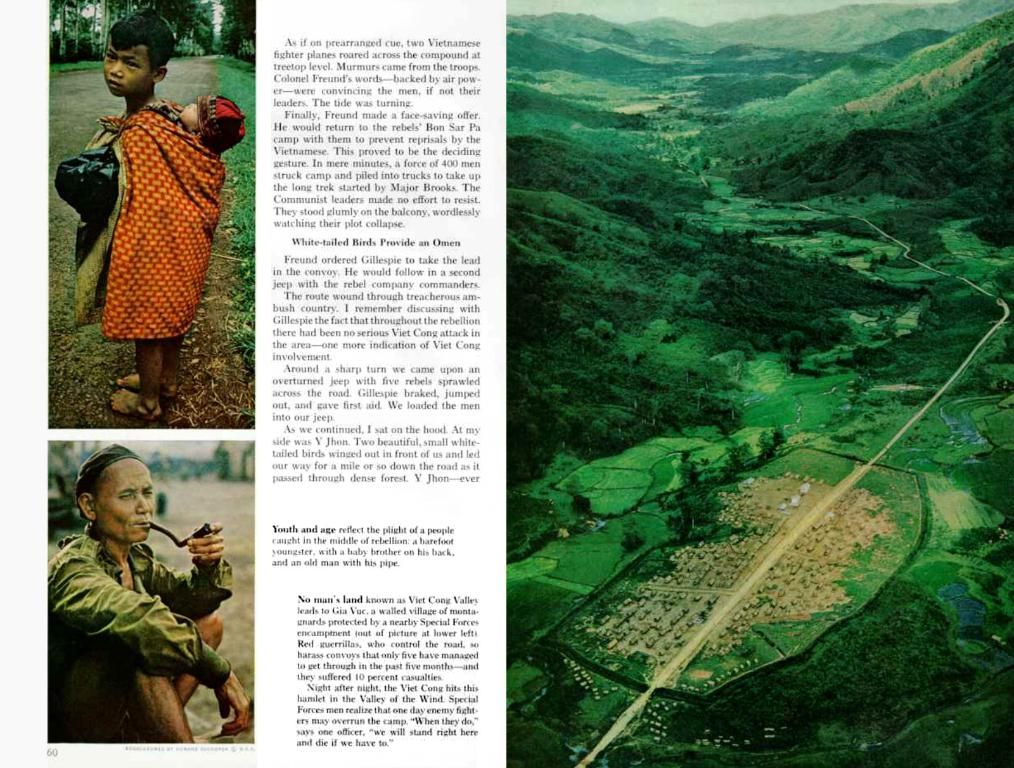Predictive Media Influence: Are We Living in a Constructed World Reality?
Throughout the ages, soothsayers, visionaries, and mystics have claimed glimpses into the future, offering warnings or revelations about what's to come. Once found in the depths of ancient temples or consulted by local psychics, now the modern-day equivalent of oracular insight can be found on our screens and devices, shaping our perception and reality. Today's prophets might be filmmakers, TV producers, or digital storytellers.
Modern storytelling serves as a reflection of human consciousness, mirroring fears, aspirations, and hidden truths. In our time, this mirror appears to serve as a portal, softly guiding us towards preordained narratives. The idea of oracular vision suggests media we consume plants seeds of possibility within the collective psyche. What begins as fiction often seeps into reality, prompting questions: can art merely mimic life or is life submitting to the visions engraved in art?
Science-fiction stories have a peculiar way of predicting technological and societal developments. 1984 envisioned mass surveillance before data tracking became the norm. The Truman Show foretold the rise of reality TV, exposing the creep of privacy in the digital age. Her anticipated the development of AI companions, echoing the rise of chatbots and virtual assistants like Siri and ChatGPT. WarGames warned of AI-controlled military decision-making, now increasingly relevant with modern automated warfare systems. The China Syndrome predicted the Three Mile Island nuclear accident, highlighting the dangers of corporate neglect in crucial industries.
Now, we are inundated with media fragments, potential futures subtly shaping our subconscious in a seemingly infinite feedback loop. While many dismiss this as mere entertainment or marketing, others perceive it as subliminal conditioning, embedding specific narratives into the collective psyche until they manifest as tangible events. Repeated dystopian imagery, catastrophe narratives, and AI-dominated societies slowly make once-unimaginable futures feel plausible, even predestined.
Contagion eerily mirrored a pandemic and the resulting social and governmental responses. Don't Look Up satirized the systemic inaction faced in the face of global threats, using an impending asteroid impact as an allegory for climate change while simultaneously highlighting the pattern of governments and media underestimating or disregarding existential dangers. This same indifference is observable today in the public and governmental responses to UAPs. Despite numerous testimonies and whistleblowers exposing secrecy surrounding unidentified aerial phenomena, official reactions remain dismissive, and public involvement is minimal. Just as the characters in Don't Look Up dismissed the looming catastrophe, society seems oddly apathetic to the skies, turning a blind eye to the potential revelations of our time.
Leave the World Behind revealed modern infrastructure's fragility and society's dependence on technology, showing how easily life can disintegrate when communication and power grids falter. Deep Impact and Armageddon portrayed catastrophic asteroid threats, a scenario that now induces concern for NASA and other space agencies. The real-world asteroid Apophis, set for a close approach to Earth in 2029, has fueled discussions about planetary defense, validating the notion that once-fictional futures can become our reality.
Quantum theory suggests observation shapes reality. Similarly, consistent exposure to specific themes may act as a catalyst for materialization. If collective consciousness directs energy toward preset outcomes, then the stories we continuously absorb might act as catalysts for their manifestation. If our thoughts dictate our reality, then the stories we repeatedly immerse ourselves in, whether dystopian, catastrophic, or mundane, become the building blocks of our lives.
If our minds influence our world, then it's reasonable to consider certain narratives being deliberately hidden or manipulated. The same forces that saturate media with apocalyptic and fear-based content also seem to divert public attention from topics that could significantly shift collective awareness. Though UFO discussions receive increased validation through whistleblower accounts and government disclosures, they remain marginalized, while less vital subjects receive disproportionate attention. Could it be that focalizing an event's probability actually increases its likelihood? If so, then admitting true oracular vision in the public arena may appear perilous to those hoping to control the narrative of reality.
As we immerse ourselves in storytelling, we recognize our role: not as passive spectators, but as active participants in shaping our own reality. Rather than passively consuming fear-inducing narratives, we can rewrite our own scripts by consciously curating stories and questioning the prophetic visions presented to us. As we enter the Age of Aquarius, the choice lies before us: will we continue to accept narratives that cultivate fear and needless complexity, or will we seek out stories that inspire, nurture harmony, and forge a future rich in abundance and harmony? Whatever we focus on, we attract: a fully realized Oracular Vision lies within our hands.
Did ancient civilizations exist on Earth?
Across the vast span of human history, we witness a cyclical pattern of civilizations rising and falling, leaving behind enigmatic relics such as archaeological artifacts, architectural marvels, and profound cultural influences. Countless civilizations, dispersed across diverse landscapes, rose to prominence only to fade into the annals of time, leaving tantalizing mysteries for future generations to unravel.
Is Byzantium truly a forgotten empire?
Throughout history, certain cities transcend their political and cultural significance, acting as reservoirs of enigmatic knowledge and spiritual power. Constantinople and Kiev serve as prime examples, their legacies reaching far beyond their crumbling walls. Rooted in divine symbolism and mystical traditions, their impact lingers today, shrouded in the obscurity that often veils the hidden knowledge of these cities.
The Book of Disclosure and Apocalypticism
Apocalypticism, a field of study and a perspective within various religious and spiritual traditions, revolves around the belief in impending cataclysmic events, resulting in the transformation, or even the end, of the world as we know it. Tracing its roots back thousands of years, apocalyptic beliefs have captivated the imaginations of countless individuals, offering glimpses into their fears, hopes, and expectations for the future.
Enrichment Data:Overall:
Impact of Media and Storytelling on Collective Consciousness
Media and storytelling play a powerful role in shaping collective consciousness by influencing how people perceive reality, fostering empathy, and instigating social change.
Media's Influence on Collective Consciousness
- Shaping Public Opinion: Media platforms can disseminate narratives that shape public opinion and influence collective consciousness. Through news coverage, documentaries, and other forms of media, they can create and reinforce societal narratives around issues, policies, and events.
- Social and Political Impact: Media can serve as a tool for social and political mobilization, amplifying voices and encouraging collective action towards change.
- Reflecting Social Values: Media reflects and reinforces existing social values, as well as shaping future values and beliefs. It can both mirror and influence the cultural landscape, providing a window into collective consciousness.
Storytelling's Impact on Collective Consciousness
- Empathy and Understanding: Stories facilitate emotional connections among people, fostering empathy and promoting a deeper understanding of various experiences, cultures, and contexts.
- Challenging Dominant Narratives: Stories can offer insight into marginalized perspectives and provide a platform for counter-narratives, challenging dominant social and political discourses.
- Reframing Reality: Through the creation of alternative narratives, stories can shift collective consciousness, altering the way people think about the world and prompting new ways of seeing and interpreting reality.
- Identity Formation: Stories contribute to the construction of individual and collective identities, not only reflecting but also shaping cultural narratives and fostering social bonds.
In summary, media and storytelling significantly impact collective consciousness by reflecting, shaping, and reinforcing cultural narratives, fostering empathy and social bonds, and instigating social and political change. Examining their roles and influence helps us better understand our own place in shaping the world around us.
- The modern media landscape serves as a reflection of human consciousness, mirroring our collective fears, aspirations, and hidden truths, acting almost as a portal toward preordained narratives.
- Science-fiction stories often predict technological and societal developments, with novels like 1984, The Truman Show, Her, WarGames, The China Syndrome having accurately predicted aspects of contemporary life.
- Modern media, particularly science-fiction and dystopian narratives, subtly shapes subconscious beliefs and perceptions, making once-unimaginable scenarios feel plausible.
- Contemporary films like Contagion and Don't Look Up offer insight into society's response to global crises, such as pandemics and climate change, and serve as cautionary tales for future generations.
- Quantum theory posits that observation shapes reality; similarly, repeated exposure to specific themes may act as a catalyst for their materialization, shaping our collective consciousness.
- The systematic suppression of certain narratives, like the ongoing debates on UAPs, raises questions about hidden or manipulated narratives that could significantly shift collective awareness.
- Historical relics like enigmatic artifacts and architectural marvels serve as reminders of the cyclical pattern of rising and falling civilizations, leaving mysteries for future generations.
- Cities rich in history, such as Constantinople and Kiev, have left a profound impact on human knowledge and spirituality, their legacies shrouded in the obscurity that often surrounds the hidden knowledge of ancient civilizations.






